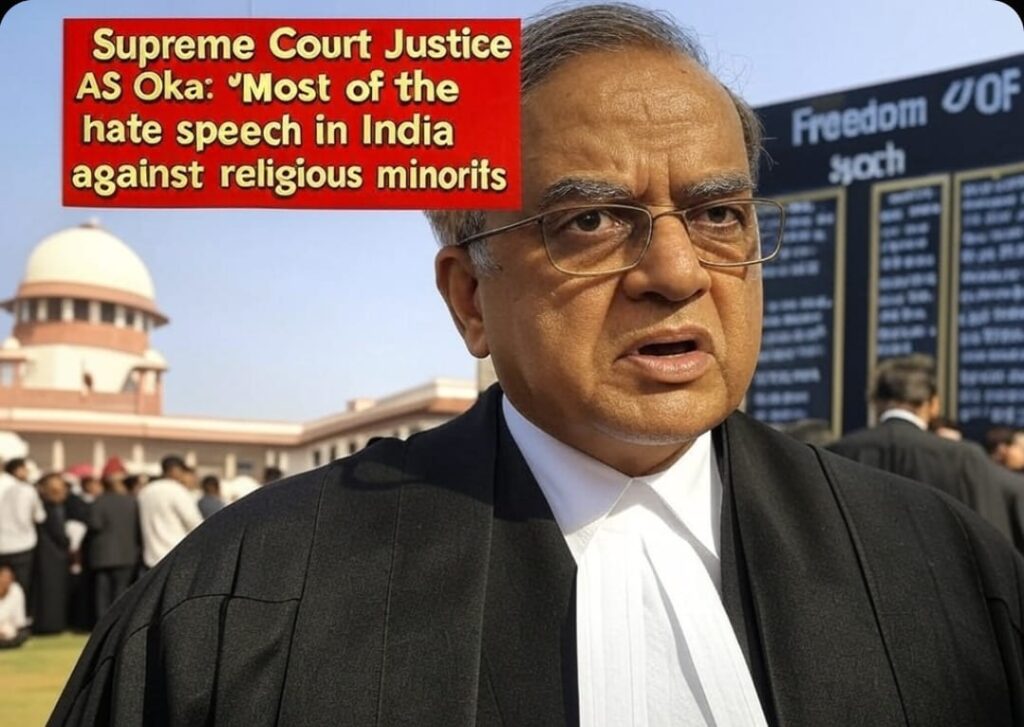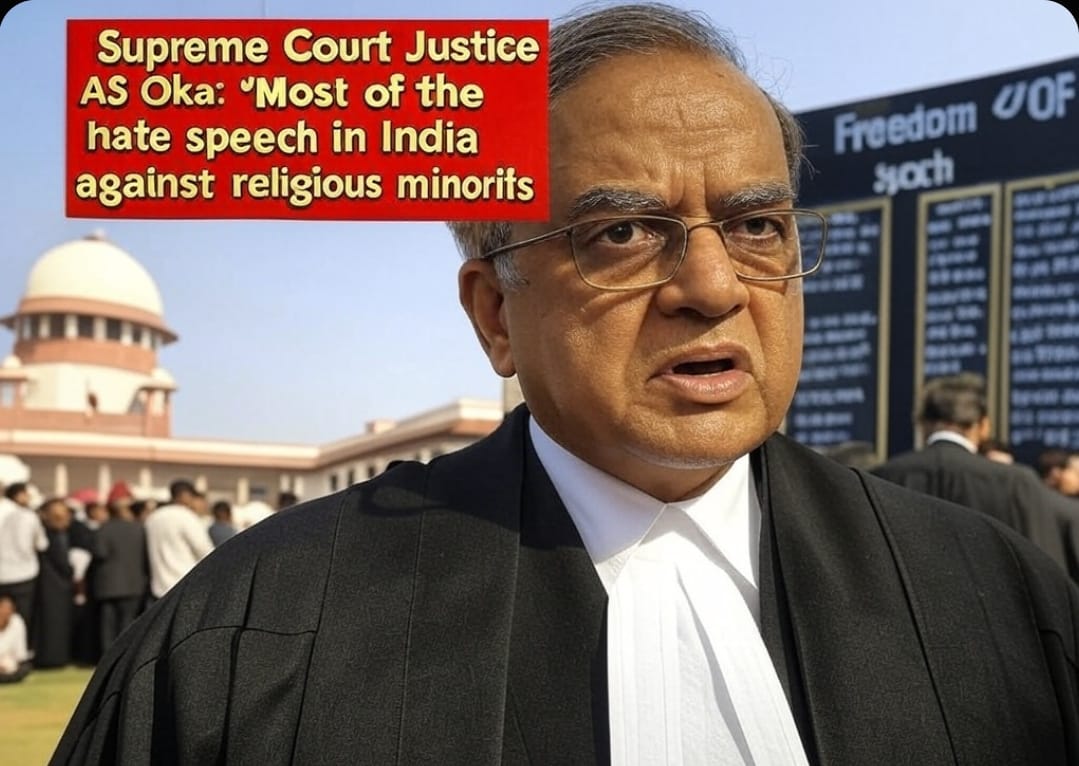
The Supreme Court justice, Abhay Shreeniwas Oka, delivered an unforgettable lecture at Columbia Law School on the subject of hate speech, which, in his observation, has been rather hypocritical in India as it unfairly selects religious minorities and oppressed communities who have been at the gallows for political actors wanting to exploit them to secure electoral victories.
Justice Oka’s speech, which was entitled “Hate Speech: Against Religious and Caste Minorities,” narrated the threats that inflammatory hate speech poses to public order while stressing that in a constitutional democracy like India, the right to free speech must be exercised along with cultivating social harmony.
These observations from India’s legal ecosystem and allied worldwide principles have set the agenda for national conversation around democracy, minority rights, and political accountability.
The Anatomy of Hate Speech: Targeting Minorities and Undermining Social Cohesion
Justice Oka noted another very distressing feature about the hate speech environment in India: targeting of organized vitriol against religious minorities, including Muslims and Christians, and caste-oppressed groups.
“Most hate speeches in India are against religious minorities and oppressed classes,” he said, adding that these speeches are “delivered to provoke the majority to attack minorities and disturb social harmony.”
According to the judge, political leaders create communal tensions during elections by positing minorities as existential threats to the national consciousness, thus polarizing electorates and making a mockery of constitutional equality.
His analysis is backed by international studies indicating that hate speech-related incidents seem to escalate during the election mood and have also been substantiated by similar findings from the Cambridge Journal on judicial responses to religious and anti-religious expression.
Legal Frameworks and Enforcement Challenges
The law against hate speech in India has Sections 153A and 295A of the Indian Penal Code in this context, which criminalize communal disharmony and insult to religion, and Section 123 of the Representation of People Act for electoral appeals against religion or caste. However, Justice Oka pointed out that there is a lack of consistency in enforcing the law. “Just having laws is not enough. The real difficulty lies in distinguishing between legitimate dissent and unlawful incitement,” he said.
When hate speech includes cultural or nationalist symbols, the interpretation of the law is sometimes too subjective. Justice Oka referred to Virginia v. Black (2003), in which the U.S. Supreme Court found cross burning to be intimidation but acknowledged non-threatening uses. Likewise, he cautioned against overreach, arguing that anything less than a precise definition may hamper freedom of expression. “Penalizing hate speech should not violate the freedom of speech and expression,” he held, favoring a standard of “a courageous mind” above the sensitivities of the “most vulnerable listener”.
Education and Fraternity: Constitutional Antidotes to Hate
Justice Oka talks about constitutional education as one of the basic facets of combating hate speech. He hopes to transform societal mindsets through institutionalization of the Preamble’s principle of fraternity- the duty to uphold collective dignity. “If we educate masses about fraternity, instances of hate speech will decline,” he stressed, further insisting that schools and universities must train pupils to recognize coded bigotry and resist divisive narratives.
This approach is reminiscent of the global attempts to fight hate speech through education rather than exclusively legal avenues. Comparative studies suggest the European Court of Human Rights has increasingly been emphasizing education to tackle anti-religious sentiments. But Justice Oka sees a broader engagement beyond the classroom and advocates for community dialogues through which minority experiences will be humanized and interfaith solidarity nurtured.
Balancing Free Speech and Social Responsibility
Justice Oka devoted considerable attention to the importance of protecting free expression, including satire, comedy, and dissent. He stated, “If there is no free speech, the right to live with dignity disappears,” citing past cases he decided in favor of stand-up comedians and activists being frivolously charged with hate speech. He explained the distinction between harmful speech aimed at questioning power and hate speech calling for immediate violent actions and called on the courts to step up contextually.
This position finds support in the U.S. Supreme Court’s decision in R.A.V. v. St. Paul (1992), wherein it invalidated overbroad hate speech laws but continued to allow narrow restrictions on true threats. Justice Oka similarly warned against equating political parody with hate speech, saying, “Courts must protect satire unless it incites violence.”
Judicial Integrity and Historical Context
Justice Oka’s commitment to judicial independence was amply demonstrated in 2017, when the Maharashtra government accused him of bias in cases of noise pollution. He demanded an unconditional apology, saying, “The damage to the institution is irreparable.” In many ways, this episode reveals his deeply held principle that the courts must be impervious to political pressure — one that informs his choice of words on hate speech now.
Historically, India’s hate speech jurisprudence has moved from the regulation of communal writings in the 1960s to controlling online misinformation today. Justice Oka’s speech built upon this background, asking for quick case resolution and offering higher punishments for hate speech, while also retaining protected avenues for journalists and students from retaliatory litigation.
Implications for Pluralistic Democracies
Justice Oka’s address is a global discourse – offering a democratic antidote to an increasing majoritarianism. His emphasis on education rather than punishments and on carefully crafted forms of legal redress to differing assault on free speech is meant to protect minorities. In a world that sees far-right forces rampant with xenophobic rhetoric, Justice Oka’s findings correlate with the conclusion of the Cambridge Journal that courts are effective in defending the marginalized voices.
Conclusion: A Call for Constitutional Renewal
To conclude, Justice Oka invoked the Preamble’s vision of fraternity as “the oxygen of democracy.” His speech holds a challenge for citizens and institutions to counter hate speech with shared responsibility, legal rigor, and moral courage. In the face of accelerating communal tensions in India, these reminders from Oka are that social harmony would never mean the silencing of opposing beliefs, but would rather require an active solicitation for empathy-a lesson with dire relevance for democracies across the globe.
About Author
Syeda Ayesha is a passionate 3rd year BBA LLB student at Sultan-Ul-Uloom College of Law in Hyderabad, with a special interest in criminal law and family law. She has built her academic journey on a solid foundation of legal principles, progressing from basic to advanced levels, and is eager to apply this knowledge in practice. Determined to gain practical experience, she is committed to learning more about the law. Ayesha is excited about the opportunity to work in a dynamic legal environment, which she sees as a valuable avenue for both personal and professional growth.

